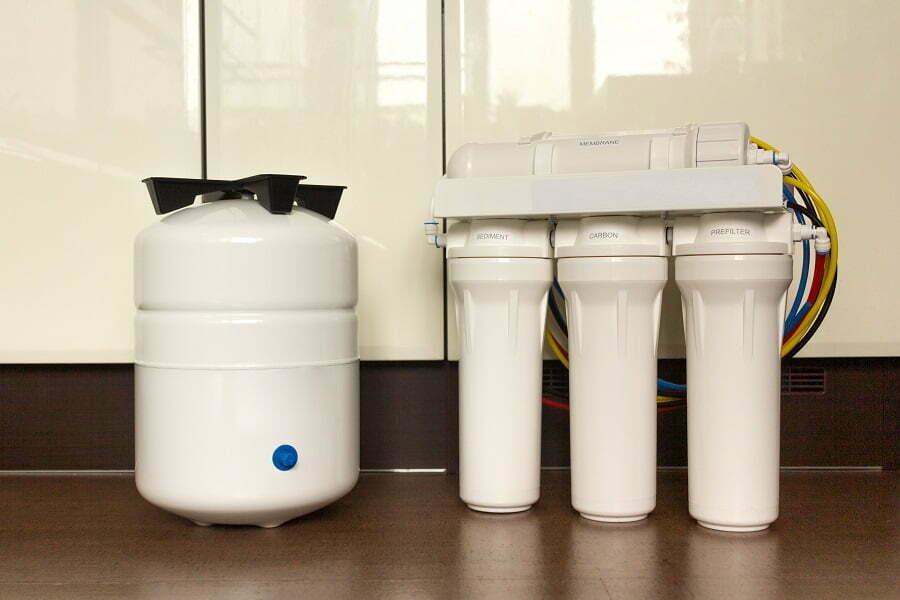Last updated on
Finding the best well water filtration system can often be defined by avoiding the most common mistakes. These include failing to properly analyze the water chemically and not knowing the pump’s flow rate in gallons per minute.
It’s also critical to understand how well water systems work so that you can choose the best well water filtration system based on several factors.
Choosing a Filter for Whole House Water Filtration

Whole house filters ensure that your water is both clean and potable, and choosing the best filter for your needs depends on getting an accurate analysis of your well water’s chemical makeup. All filters have limits for filtering out certain chemicals. For example, most well water is naturally acidic and would require a PH neutralizer filter for wells. Your water needs treatment to counteract acidity accurately so that you don’t accidentally turn the water into a base.
If your well is located near a gas station, industrial site, or agricultural site that uses lots of chemicals, your water might be contaminated with hydrocarbon runoff or other chemicals. That’s why it’s so important to get a proper analysis. Furthermore, the EPA doesn’t regulate private wells nor does it provide any standards in local rules and regulations. The EPA does provide property owners with basic guidance on how to treat and remove common bacteria that could reside in your well water.
Knowing How Your Pump System Works
It’s important to know how your pumping system works because lots of different factors can affect how your system filters the water. For example, you might have a jet pump installed on the ground to draw water up from a shallow well and generate pressure for the house. Some treatment systems employ a large holding tank that holds the water before it’s actually pumped into the house. Other systems are gravity fed, using gravity to create the necessary water pressure.
It’s important to understand how your particular system performs before choosing the right water filter because different treatment methods can affect the water’s flow and water pressure. A good example of this phenomenon is a system that uses a pressure tank. In that case, it’s necessary to set the treatment tank before you choose a water treatment system to avoid damaging the well’s pumping system.
How the Pump Flow Rate Impacts Your Water Treatment System
It’s relatively easy to test your flow rate, which affects your choice of a water treatment system. Wells and pumps come in different sizes, so they pump water at different rates. When you know the rate in gallons per minute, you can pair the pump with a treatment system designed to work well for that flow rate.
You don’t always need a fancy system that filters out everything. Most whole house filters are engineered to remove particulates up to 0.35 microns. Your system might also remove heavy metals and chlorine. Some treatment systems include a UV light purifier, water softener and other treatment options to purify the water completely, but these aren’t always necessary.
That’s why it’s so important to test your well water to see what kind of foreign materials are in it. Your well water might be perfectly safe being filtered by the power of natural earth. If it has a high chlorine level and smells like a public pool, all you might need is a simple GAV cartridge.
Almost all treatment systems are self-cleaning, and they need a certain flow rate to power the self-cleaning function. For example, your system might require a 10 gallons-per-minute flow rate, but the pump only produces an 8 falling-per-minute flow. After a certain amount of time, the system will fail to backwash as intended, which can lead to water fouling. The system can fail catastrophically after the filter seizes up and solidifies.
That’s why it’s so important to match your well pump’s flow rate with the recommended water filtration system, based on your particular water’s chemical makeup. Meeting the recommended flow rate ensures that there is enough force to move the water through the system’s media bed to ensure full cleaning. The same holds true for installing an oversized water treatment system because they can cause a loss of pressure.
Water Pressure Level Is a Major Consideration
The water pressure in your well also plays a crucial role in choosing the right treatment system. Any treatment system reduces water pressure as the water flows through the media bed. You must determine the pressure from the well pump and related pressure-building system before you select a filtration system.
The result must satisfy your bathroom needs, as well as having sufficient water pressure for washing machines, dishwashers, etc. Some well pumps have a built-in function that fine-tunes water pressure if it’s not naturally high enough to meet your needs.
Choosing the Best Well Water Filtration System
Depending on your water’s chemical analysis, different filtration systems might be required to filter out contaminants, Unfortunately, there are no one-size-treats-all treatment systems. Different impurities, flow rates, and water pressure levels require different filtration systems.
When choosing a filtration system, it’s critical to determine the capabilities of the treatment, such as which impurities are extracted, what pressures the system can operate with and the number of flow rates the system can accommodate.
If your filter system meets NSF or Water Quality Association standards, that’s a bonus, but you should be aware that certifications raise the price of the filtering systems. Those filters that aren’t tested aren’t necessarily of poor quality. They often are the only viable option for families on a budget or small commercial organizations. Some filters are independently tested against NSF/ANSI/WQA standards.
Parting Thoughts
Many urban and suburban dwellers decide to move to the country and discover that the water system is based on water from a well, which can be dangerous or unpalatable. Well water is often contaminated by rust, sediment, and other chemicals that enter the water table. Bad odors are often a problem, and harmful bacteria can make everyone sick.
Choosing the best whole house water filtration for wells involves some research, testing, and system installation, but when done properly, you can fix any issue with your water. There are many filtering options, based on water pressure, flow rates, and the chemical composition of the well water.
Recap:



